By Richard Skanse
As any songwriter who ever had the experience can surely attest, one did not walk into a co-writing session with Guy Clark with a swaggering air of confidence. Any swelling of ego brought on by the initial invitation itself was guaranteed to be replaced by cold-sweat, stomach-churning anxiety the moment you pulled up to his house, and by the time you actually stepped inside his storied workshop, watched him fire up a cigarette, and processed the full weight of his opening salvo — something like “Well, show me what you’ve got …” — it was serious gut-check time. And if you were lucky enough to be invited back a second time, or hell, a hundredth time, odds are it never got markedly less intimidating — even if you knew going in that you’d already earned the man’s respect and perhaps even the right to call him a genuine friend. No matter how many songs you co-wrote or played with the guy, that imposing bar never lowered so much as an inch.
Guy Clark is gone now, but that bar remains — high as ever — anytime his songs are sung or played. And you can bet that every artist onstage at the Paramount Theatre Friday night (April 7) for the Texas Heritage Songwriters’ Association’s Darrell K Royal Homecoming Show, billed in part as a tribute to Clark, was keenly aware of it — along with knowing that the bar for Clark tributes very much like this one is way up there, too. Especially in Austin. After all, the last time a group of Clark’s friends, peers, and younger admirers gathered together in this town to celebrate his music, the man of honor himself wasn’t just in the house, he was closing the show. That was back in November 2011, when Rodney Crowell, Jerry Jeff Walker, Lyle Lovett and more than a dozen other Americana and Texas music all-stars aligned at the Long Center for the Performing Arts for “Wish I Was in Austin: A 70th Birthday Tribute to Guy Clark.”
With the exception of Clark, all of the performers that night — including everyone in the Shawn Camp and Lloyd Maines-led house band — had been featured on the recently released This One’s for Him: A Tribute to Guy Clark, a double-CD labor of love co-produced by Camp and writer, publicist, and artist manager Tamara Saviano. That tribute record would go on to be nominated for a Grammy and win Album of the Year at the following October’s Americana Honors and Awards in Nashville. Two years later, Clark would win his own first-ever Grammy for what turned out to be his final album: 2013’s My Favorite Picture of You. The Monahans-born troubadour, regarded by many as of the best (or as more than a few would argue, the best) Texas songwriter of all time, passed away at age 74 on May 17, 2016, a few short months before the publication of his friend Saviano’s years-in-the-writing biography, Without Getting Killed or Caught: The Life and Music of Guy Clark. Fittingly, Saviano also helped organize the 20-artist tribute to Clark held last August as Nashville’s Ryman Auditorium — a public wake that Vince Gill aptly described as “a three-hour show where not one song sucks.”
In light of all of the above, there was a palpable (but by no means unwelcome) feeling of deja-vu at Friday night’s Paramount affair — and not just because a handful of the evening’s performers, including Crowell, Terry Allen, Joe Ely, and the Trishas — had previously played at one or both of the previous two Clark tributes. Saviano was very much a part of this fete, too. The key difference this time around, though, was that instead of spearheading the event from behind the scenes, the Wisconsin-born, Nashville-based “honorary Texan” was there to be honored onstage herself — as the recipient of the Texas Heritage Songwriters’ Associations’ esteemed Darrell K Royal Texas Music Legend Award. (Clark, for the record, was inducted into the THSA’s artist-only Hall of Fame back in 2009, the same year as Willie Nelson, Michael Martin Murphey, and Allen Shamblin; the next round of Hall of Fame honorees — Buddy Holly, Mickey Newbury, Ray Wylie Hubbard, and Liz Rose — will be inducted at the THSA’s Hall of Fame Weekend celebration next February at Austin’s Moody Theater.)
Named after the famed University of Texas football coach who steered the Longhorns to three national championships while also championing the music of Lone Star artists throughout his life, the DKR Texas Music Legend Award was established by the THSA to recognize those who have distinguished themselves in the industry for their above-and-beyond contributions to the cause of supporting and enriching the Texas songwriting community. In addition to Royal himself, past recipients include (among others) legendary country radio DJ Bill Mack and beloved central Texas club owners James White (Austin’s Broken Spoke) and the late Kent Finlay (San Marcos’ Cheatham Street Warehouse).
Saviano, a former music journalist and TV/radio writer and producer, launched her own public relations company in 2002 and soon after expanded into artist management (Kris Kristofferson), special event production, and record producing — overseeing not only the aforementioned This One’s for Him but tributes to Kristofferson, Jackson Browne, and the 2004 Grammy-winning Beautiful Dreamer: The Songs of Stephen Foster. She spent the better part of a decade writing Clark’s biography, and is currently in the midst of writing, producing and directing a feature-length documentary on his life and career. As the evening’s master of ceremonies Rodney Crowell summed it up best in the short video that preceded Saviano’s acceptance speech, “Truly, Tamara is drawn to poets — she enhances poets’ lives.” But Saviano made it clear that the poets she’s worked with have all enhanced her own life, as well. Especially the Texas ones.
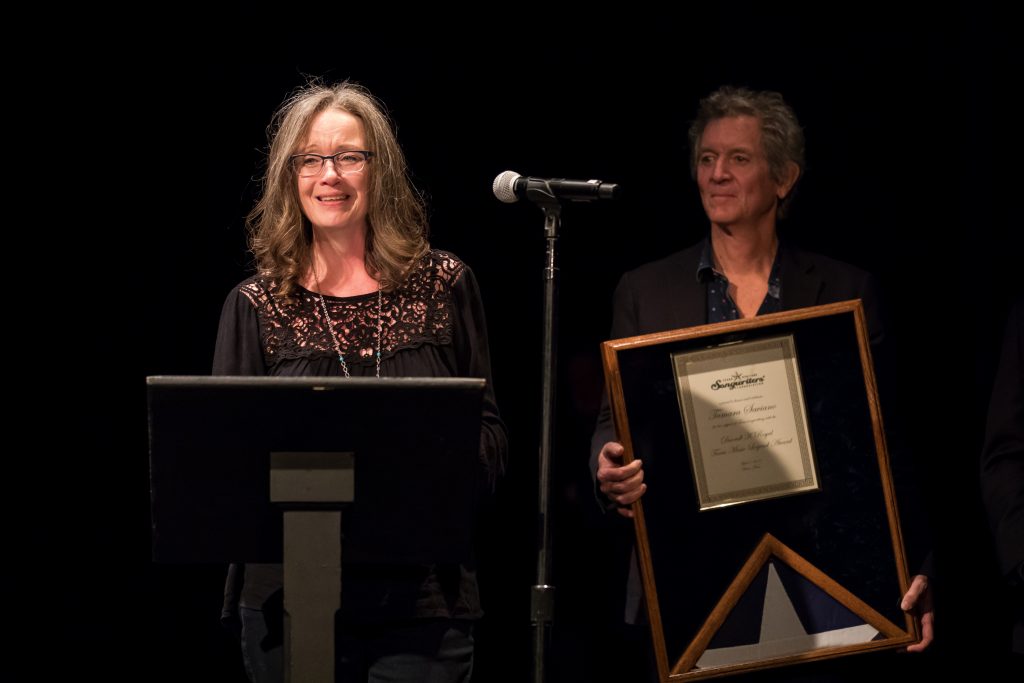
The Wisconsin Girl and the Houston Kid: Darrell K Royal Texas Music Legend Award honoree Tamara Saviano with one of her many Lone Star poet friends, Rodney Crowell. (Photo by Ted Parker Jr.)
“The first time I came to Texas 20 years ago, I saw Jack Ingram play at Stubb’s, and then went to a Flatlanders party at Joe Ely’s house,” she said from the podium, reading from a prepared speech and noticeably struggling to keep tears in check. “From that moment, my biggest dream was to work with Texas songwriters and spend as much time as possible in Austin … A few years back, (THSA executive producer) Terry Boothe made me an honorary Texan, and I’ll take that if you’ll have me …
“Guy would be so proud tonight,” she continued, referring to the man who became one of her dearest friends over the course of their time working together. “I still can’t believe he’s gone, and I miss him every day. Many of his friends and family are here tonight, onstage and off, and we haven’t all been together in one place since Guy’s memorial. But … grief shared is grief diminished, and tonight I feel only joy and gratitude.”
After that — well, and one more short video, this one featuring a quick overview of Clark’s career and legacy with archived interview clips from the man himself — it was time for the songs. The house band — featuring Scrappy Jud Newcomb on guitar and mandolin, bassist Bruce Hughes, drummer John Chipman, fiddle player Brian Beken, and keyboard player/singer Johnny Nicholas — had actually kicked off the evening with a spirited run through “Texas Cooking,” but it was Crowell (himself a 2008 THSA Hall of Fame inductee) who opened the tribute portion of the evening with a solo acoustic performance of “Stuff That Works,” a song he co-wrote with Clark in the early ’90s. He introduced it by talking about the “pity party” he’d been throwing for himself in the wake of his divorce from fellow songwriter Rosanne Cash, telling himself and anyone who would listen at the time that he was thinking of “throwing in the towel on this music thing.” But Clark wasn’t having it. “Shut up,” he growled at Crowell after showing up at his front door one day. “Then he pushed me back in the house and said, “I’ve got an idea for a song,’” Crowell recalled. “So we wrote this song that day, and at the end of the day, I was back in the music business.”
Firsthand anecdotes like that were the norm for the night, with almost every artist sharing a fond memory about the impact Clark (and/or Saviano) had on their life and career. Verlon Thompson, Clark’s longtime guitarist, fondly recalled how Saviano had once insisted on accompanying them on a short tour run, just to get a sense of what life on the road was like for the duo. “I don’t think she’s ever recovered,” he said with a laugh. “She said, ‘I thought girls had to pee a lot!’ It took us like 27 hours to get from Nashville to Baton Rogue, because we stopped at every McDonalds on the way, not just to pee but to eat! By the time we got to Baton Rouge, Tamara was covered with fast foot wrappers in the back seat. But that’s how dedicated she was to getting his story right.” He also talked about the time Clark gave him — under some bewildered protest by Thompson himself — a Bourgeois Country Boy guitar, the very model he’d been coveting, which Clark just happened to have in a case under his bed. “I could tell he was about to get angry, so I finally told him, ‘OK, Guy, I’ll take it, and it’ll be in my custody, but it’ll always be your guitar,’” Thompson explained. “And Guy said, ‘Whatever.’
“This is that guitar,” he said proudly to a roar of applause, then reared back and launched right into — what else? — “The Guitar,” fingers burning.
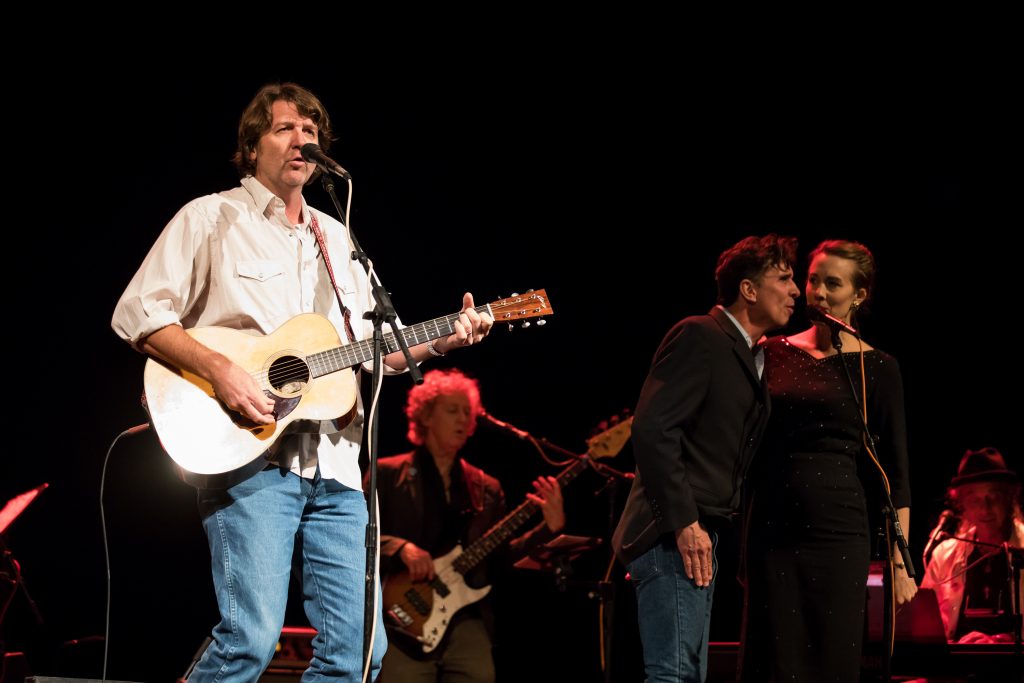
Bandera to Baton Rouge: Bruce Robison joined by Noel McKay and Brennen Leigh (with Bruce Hughes from the house band on bass and Johnny Nicholas on keyboards). (Photo by Ted Parker Jr.)
Those first two performances would be hard to top, but every artist in Crowell and Thompson’s wake did right by their chosen songs. Jack Ingram’s wheels-off tear through “L.A. Freeway” (backed by the house band with vocal assists from Kelley Mickwee and Jamie Lin Wilson of the Trishas) maybe could have used a couple more run throughs in rehearsal, but there was no mistaking his wholehearted enthusiasm. Crowell returned to the stage sing with Brennen Leigh on “Heartbroke” (another song he co-wrote with Clark), and Lee Roy Parnell and the band (with his brother Rob Roy Parnell guesting on harmonica) delivered an intriguingly electrified spin on “Dublin Blues. Another nice surprise: Noel McKay, rather than playing the song he actually co-wrote with Clark on My Favorite Picture of You — “El Coyote,” a staple of his own live sets — instead sang the same album’s title track, his voice so close in deep, warm tone to Clark’s that it sounded like Guy himself was at the mic. McKay (with his longtime partner, Leigh) would later join Bruce Robison for “Baton Rouge,” prompting Robison to remark about how proud he was to be sharing the stage with a fellow Bandera boy. Shawn Camp prefaced his own Clark co-write, “Sis Draper,” with a colorful account of the song’s namesake inspiration, and an amiable Terry McBride — writer of dozens of mainstream country hits for the likes of Brooks & Dunn, Reba McEntire, and his own band, McBride & the Ride — led the band through a rowdy “Rita Ballou.”
The homestretch from that point on was pure gold. Although Joe Ely, the Trishas, and Terry Allen were all featured on This One’s For Him (and the coinciding Long Center Guy Clark birthday celebration), they each had new covers to share this time. Or at least, different ones. With Parnell having already beat Ely to “Dublin Blues,” the Flatlander instead sang the latter-day (2006) Clark beauty “Magdalene” — which he’s been performing regularly since recording it on his own 2015 album, Panhandle Rambler. And with it being a bit too far away from Christmas to break out “X-Mas on the Isthmus” — and with “Old Friends,” his own This One’s for Him track obviously reserved for the everyone-back-onstage finale — Allen naturally offered up the bittersweet “Queenie’s Song,” a song he co-wrote with Clark after Allen found his beloved family dog dead one New Year’s Day, apparently having been shot by some S.O.B. right on his own property. (Clark’s practical but not especially sympathetic response when Allen came back in the house and broke the news? “Let’s write a song about it!”)
In between Ely and Allen, the Trishas (Mickwee, Wilson, Liz Foster, and Savannah Welch) traded verses and shared heavenly harmonies on a stunningly lovely “Desperados Waiting for a Train” — ceding the last verse (“Come on, Jack …”) to Ingram. That left “She Ain’t Going Nowhere” — which the Trishas covered so exquisitely on This One’s for Him — for Crowell and Thompson, who sang and played it into a shared mic just before the aforementioned “Old Friends” grand finale.
Watching everyone singing and playing that last number together, it was hard not to get a little choked up reminiscing about the last time so many of them shared a different stage here in Austin, serenading Clark in person with “Happy Birthday” (and presenting him with a cake full of candles to blow out, too.) But just as Saviano had said earlier, there was far more joy and gratitude than grief in the Paramount Friday night. And as Crowell noted in his own comments at the start of the evening, Clark would have certainly felt it, too.
“Knowing Guy … as any of you who knew Guy at all would know, he could be kind of grumpy,” Crowell admitted with a chuckle. “And he would probably be like, you know, ‘What does any of this have to do with writing any more good songs?’ But I know inside, he would be brimming with pride. You’d go visit him a few days later, and he’d fire up a cigarette and go, ‘You know, the other night they honored my songs. And I feel pretty good about that today.’
“So trust me,” Crowell said, “he is proud. He would be proud.”




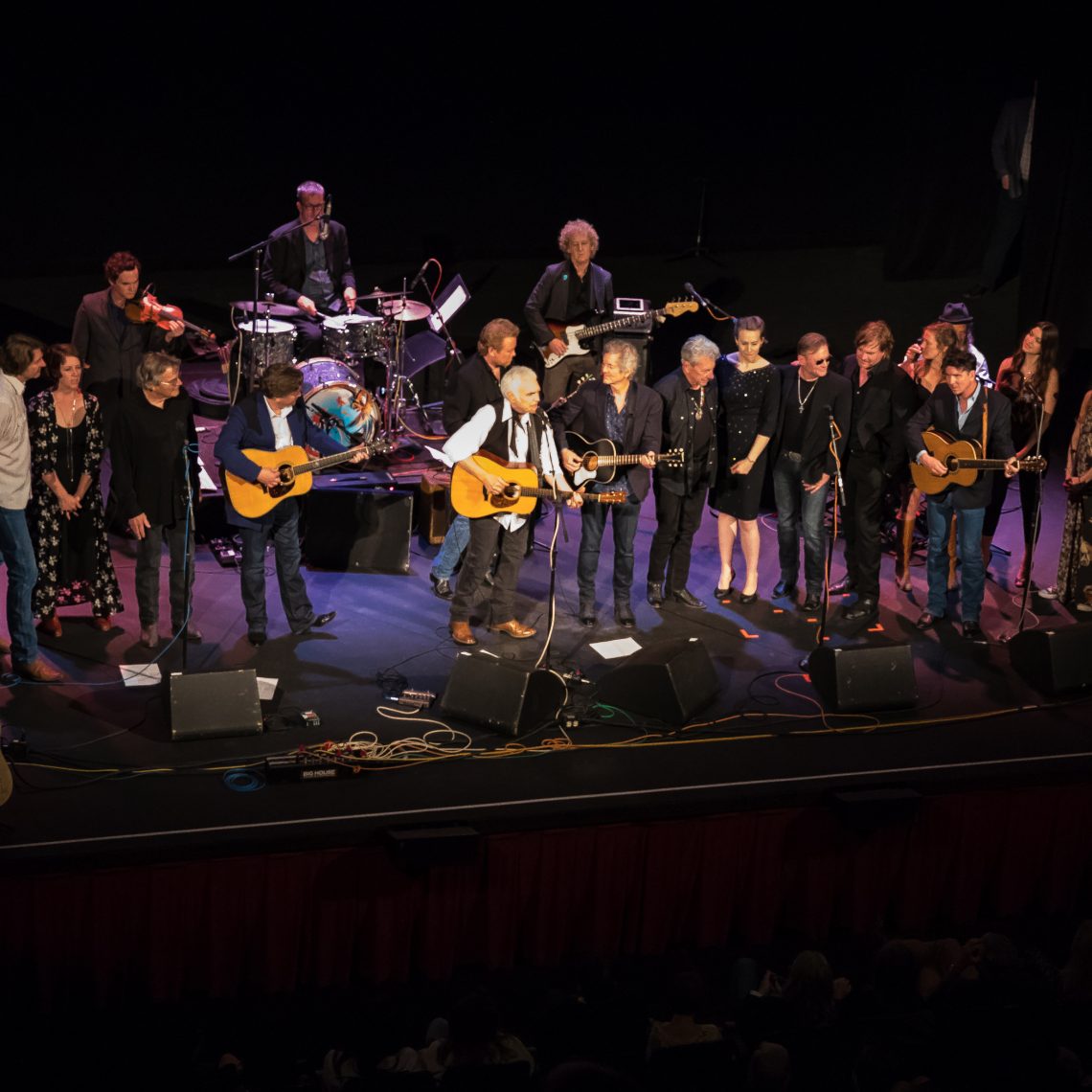
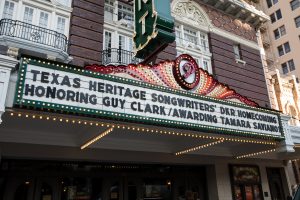
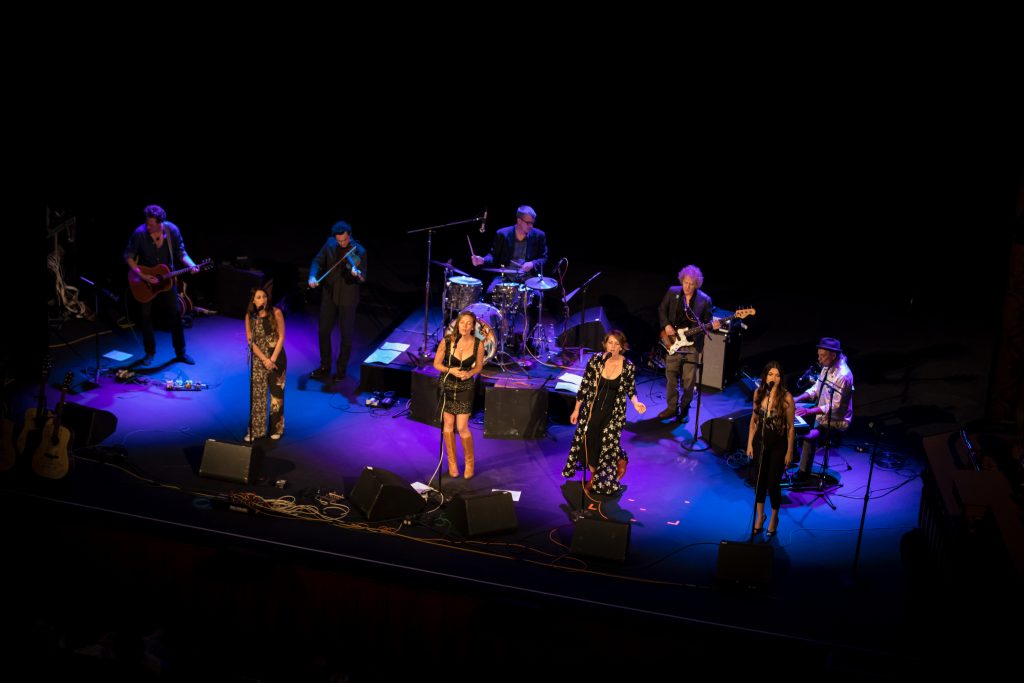

Great review. Reading it I am enjoying that magical night all over again, basking in the warmth of Guy’s spirit and Tamara’s sincere dedication to his poetry.